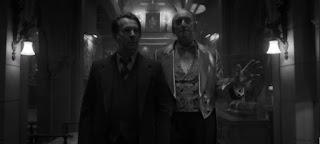The Story: Publisher William Randolph Hearst puts Screenwriter Herman J. Mankiewicz in his place, literally and figuratively.
In Mank, David Fincher's realization of his father's screenplay about the writing of the movie Citizen Kane, the relationship between Hearst and his mistress, Marion Davies, and Mankiewicz is background, a significant part of his life that informed the formation of the project which he'd conceptualized with the title "American." Davies and Mank knew each other through Charles Lederer, her nephew and a screenwriting pal of Mank's. As a result, Mankiewicz started to accompany Lederer on weekend trips to Hearst's castle, "La Cuesta Encantada," in San Simeon, California. Hearst and Mank became gossipy friends—Mankiewicz was renowned for his wit, and it was what attracted Welles, as well. But, he was also an alcoholic, and...those trips stopped happening.
Mank speculates that Mankiewicz's cozy relationship was soured by his seeing Hearst's and M-G-M head Louis B. Mayer's use of the studio to orchestrate a smear campaign against 1934 gubernatorial candidate Upton Sinclair, a progressive. And when Sinclair lost, Mank, in his disappointment as well as in his cups, takes his bitterness out on the power-brokers. That doesn't play well. And his wit doesn't save him from the consequences and the very expensive rug is pulled out from under him. Righteous indignation may be personally satisfying, but it has penalties, no matter how righteous.
And that's when the Parable of the Organ-Grinder's Monkey comes in. I've briefly talked about the ironies of Mank (in my review of it) and another telling little example of Welles' influence is the insertion of a fable which casts a shadow on the tale—something he did in Mr. Arkadin and The Trial. The Parable of the Organ-Grinder's Monkey is a lesson in perception and how it can be wrong; the monkey assumes that he's the one in power, given the attention paid to it, rather than the reality of it being merely a distraction, a small—and rather helpless—participant. The chain around his neck may be made of gold. But, it's still a chain. Without it, and without the accoutrements provided the monkey, he's just a monkey...of no particular worth.
And with that metaphorical rejoinder (to Mankiewicz's own), Hearst lets him know who's in charge, and shows him the door. End of story. End of the party. End of the relationship.
End of lesson.
The Set-Up: In flashback, as he's about to confront Orson Welles (Tom Burke) about receiving a writing credit for his script "American," Herman J. Mankiewicz (Gary Oldman) recalls his final meeting with William Randolph Hearst (Charles Dance). At one of Hearst's elaborate costume parties, Mankiewicz has gotten drunk—drunker than usual—and he talks about a story he wants to write, one that is a fanciful metaphor for the host. It does not go over well, and after Mankiewicz vomits on the floor, the guests scatter, leaving Mankiewicz alone with his host. The party's over.
Action.
INT. SAN SIMEON - NIGHT - (FLASHBACK - CONT'D) 79
HEARST Mank, Mank...
MANK What I said - was more in sorrow than in anger, Willie.
It's dead still. The two men alone in the room. HEARST crosses to MANK, and putting a fatherly hand on his shoulder, turns and guides him toward the exit.
HEARST Are you familiar... HEARST ...with the parable of the...HEARST ...organ-grinder's monkey?HEARST Now, the organ-grinder's monkey is tiny in stature,
MANK (softening blow) Wha- Willie -
As they reach the front door:
EXT. SAN SIMEON - NIGHT
HEARST as he eases MANK out.
HEARST And every time I do decide to dance -


















































No comments:
Post a Comment